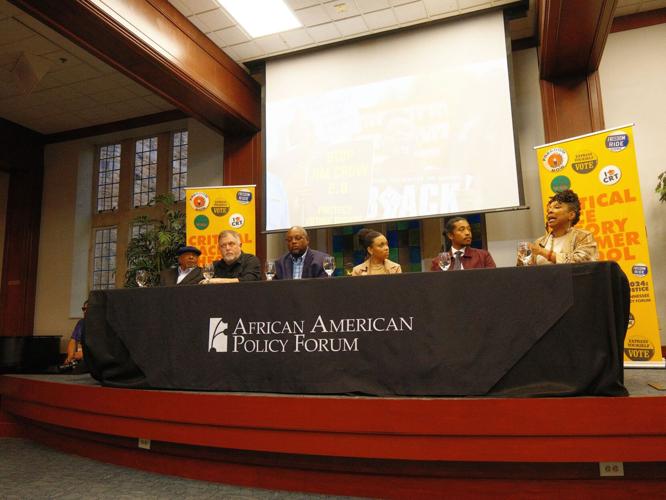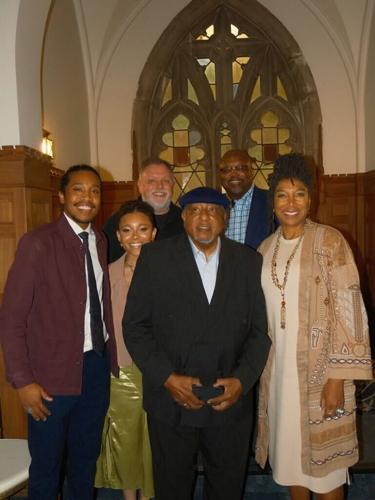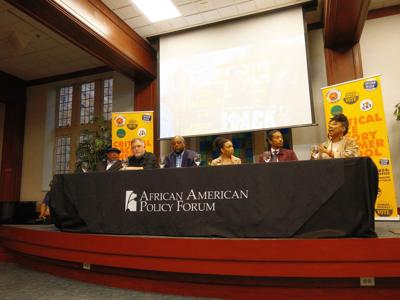The phrase that kept coming up — from an opening panel discussion to final conversations in the lobby of the Scarritt Bennett Center — implies both offense and defense.
“This is the tip of the spear,” explains Kimberlé Crenshaw, a professor and advocate credited as a founding scholar of critical race studies. “Tennessee is the home of [Nathan Bedford] Forrest and the home of Ida B. Wells. It's the home of the Ku Klux Klan and the Nashville Student Movement. We're at a place where these dynamics are so robust and rich. Sometimes the dynamics of discrimination and oppression are also the same sites where resistance is deeply rooted in the soil.”
The African American Policy Forum, co-founded by Crenshaw and Luke Harris in 1996, brought its fifth annual Critical Race Theory Summer School to Nashville in late July and early August, the first time the conference has offered events in person. Workshops and panels featured scholars like Michael Eric Dyson, Nancy MacLean and Jason Stanley. Nashville’s Democratic state Rep. Justin Jones, another featured speaker, helped bring the event to Nashville. While individual participants who spoke with the Scene recall regular threats to their personal safety, the conference did not draw any protests, threats or security concerns.
The TN GOP offers no evidence the ban actually protects kids — and it may instead deny kids a full and accurate education
Language, laws and politics around race have shifted dramatically since the police murder of George Floyd in May 2020. Along with international protests against police violence came a pointed backlash against Crenshaw’s particular academic niche, critical race theory. Decades of nuanced work focused on analyzing structural racism, confined for decades to lectures and academic papers, quickly turned into simplistic talking points for GOP politicians and conservative media. Conservative activist Christopher Rufo immediately elevated CRT into the public discourse; the topic caught the attention of then-President Donald Trump, who issued an executive order in September 2020 that decried the “destructive ideology” of race-based workplace discussions, specifically federal diversity, equity and inclusion (DEI) training.
Conservative Tennessee lawmakers quickly cobbled together their own 2021 law banning certain ways of talking about race. The legislation, touted by proponents as a ban on critical race theory, broadly defines “prohibited concepts of instruction” to include teaching “divisive” ideas about identity, along with topics that may subject students to “discomfort, guilt, anguish, or another form of psychological distress.”
State provides more specific information on what can be taught in schools, and what happens to those who violate the law
Tennessee’s efforts to control discussions around race have also prompted crusades against books that tackle Black history and Black experiences. All of it has created a minefield for teachers, who now navigate a legal gray area when discussing racism and civil rights. Terms like DEI and CRT have become catchalls for discussions about civil rights, Black history and white supremacy.
“It’s shocking that there are elected officials who believe the way forward is to make certain ideas illegal, and certain histories untellable,” says Crenshaw, who describes the anti-CRT backlash as a “tornado” of misinformation from opponents. “The desire to suppress knowledge and literacy is not the tool of a strong democratic society. It is a tool of an oppressive one. For those who want a thumbnail understanding, critical race theory is simply the study of how inequalities, particularly racial inequalities, can be reproduced over time.”
Tim Wise, a white anti-racist educator born and raised in Nashville, sees the moment historically. Backlash always follows racial progress, he says.

2024 Critical Race Theory Summer School in Nashville
“The first round of white backlash to racial equity would have been when President Andrew Johnson — a famous, or infamous, Tennessean — vetoed the Civil Rights Act in 1866,” Wise tells the Scene after a conference workshop. “People don't give up power, privilege, position or even their worldview without a fight. If you understand that these attacks on DEI or critical race theory are another round of the same old thing, then you can look at what other people did to fight that thing.”
Both Wise and Crenshaw also criticized the initial response from racial justice advocates — including themselves and colleagues — in 2020. They say those early efforts put too much emphasis on individual behavior and not enough on systems. Both emphasize the progress and power that comes from interest convergence — a renewed focus on aligning the interests of minority and majority groups. Vice President Kamala Harris’ presidential campaign, already slandered by Trump and others as a “DEI hire,” brings together anti-Trump Americans with those fighting the backlash against racial progress, explains Crenshaw.
At the conference’s opening panel, Bernard Lafayette, among the disappearing corps of organizers trained during the civil rights movement, urged principled defiance.
“When people threaten you, you’ve got to make it a parade,” Lafayette told the room. “Their purpose is to run you off the street. Suppose you run out to meet them?”









